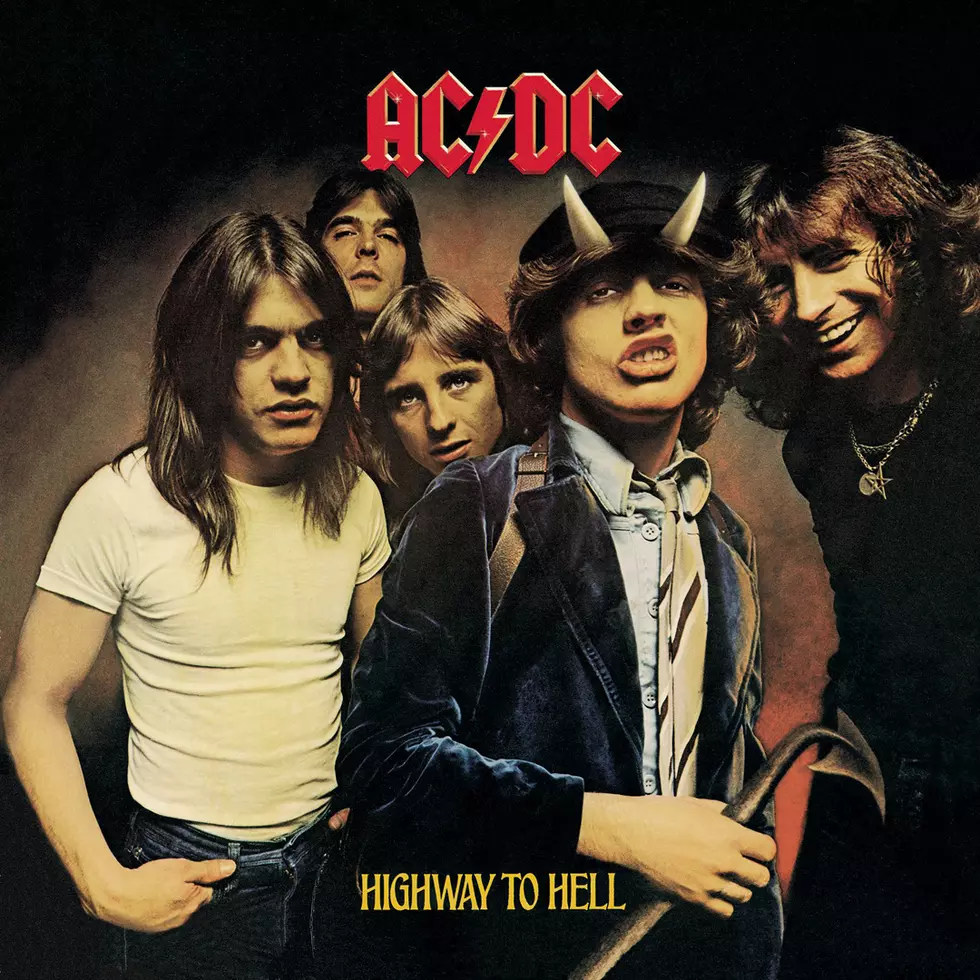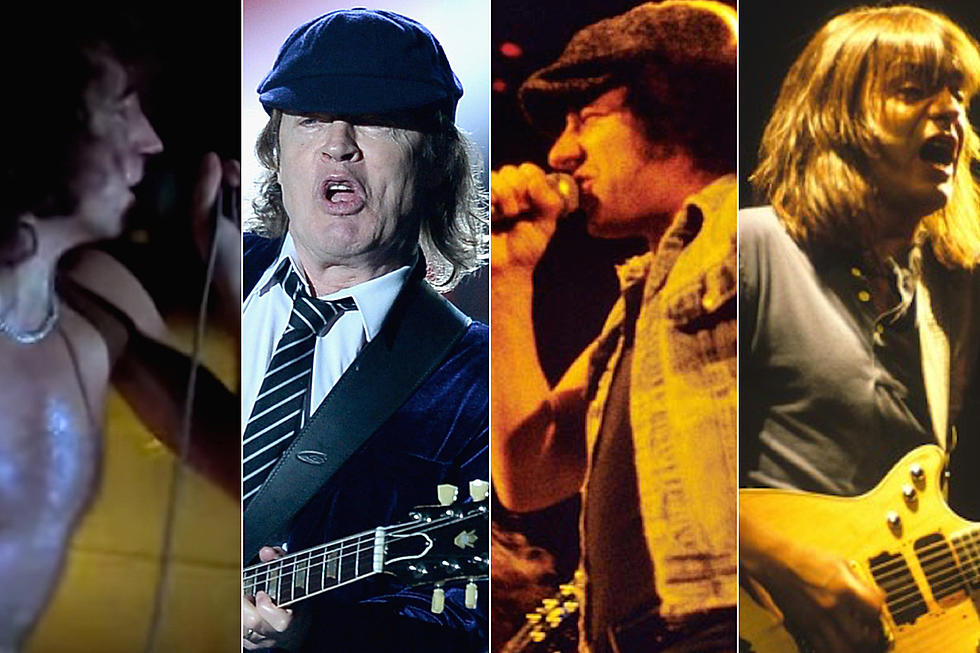
AC/DC’s Long, Winding Highway to ‘Highway to Hell’
Born on New Year’s Eve 1973, the career path of AC/DC for its first five years had started out as a rampage across the wild open roads of Australia, followed by the firmer footing of the major routes of Europe and the U.K., and then a less-than-spectacular arrival on the arterials of the U.S. – and by 1979 there was some pushing and pulling over the road map.
Until then, the Australian group had been something of a family business. Bassist and effective band leader Malcolm Young and guitarist Angus Young worked hand-in-hand with their elder brother, George Young, and his friend Harry Vanda - who'd had their own success in the '60s – to define their blues-rock sound. That, along with some successful lineup changes, had served them well; however, as work began on what would be their sixth album (although one had only been released in Australia), the family business’s partners felt a crisis point had been reached.
One of AC/DC’s greatest moves had been to replace frontman Dave Evans with Bon Scott in 1974. A friend of George Young, Scott had been working as the band’s chauffeur before an audition secured his promotion. They’d wanted him for his voice – they hadn’t expected to also get something of a street poet, whose lyrics about hard living in the pursuit of eternal youth perfectly matched the vibe created by the Young guitars.
The connection had come about when Malcolm decided to ask Scott directly if he’d consider an audition. Having completed it, he’d been offered the job but said: “Piss off, I’ve got my wife and I’m about to start a job.” On facing up to the fact that the job was to paint a rusty ship, Scott had called Malcolm, accepted the role, packed a suitcase and headed off.
Despite the larger-than-life frontman seen by fans, there was much more to Scott. “He was a fantastic guy, a real human, so different to what people thought,” early AC/DC drummer Peter Clack told Uncut in 2014. “He was honest, sincere, unpretentious, no-bullshit, hard-working.” Close friend John Bisset called him “spiritually mature” while early bandmate Murray Gracie said he was “a very respectful son. His parents came to a lot of shows, and we’d rehearse at their house.”
Even then, however, Scott’s drinking tendencies were well-known. “Bon had front, but he wasn’t an aggressive tearaway,” Gracie said. “Alcohol is what got to Bon. Even then, he’d get extremely drunk. We played surf clubs and when it was time to play we’d find Bon lying flat, asleep on the beach. We’d cart him inside and prop him in the corner with a mic.” He’d been in a youth detention center for an underage sex offense and later put himself in a coma after a furious motorcycle ride.
Scott’s first studio role was to write lyrics for songs previously prepared by the Youngs; and that resulted in the Australia-only album High Voltage, recorded in just 10 days and released in February 1975. Later that year they recorded their iconic video for “It’s a Long Way to the Top,” where Scott played bagpipes on a truck driven through the streets. Their second LP, T.N.T., arrived in 1975, and the combined effects of two records was enough to secure them a contract with Atlantic Records in 1976. Their first release via the home of Led Zeppelin was a compilation of the earlier LPs, also titled High Voltage. It was followed with Dirty Deeds Done Dirt Cheap, and then Let There Be Rock in 1976. By the time Powerage was released in 1978, AC/DC were certainly cruising, beginning to achieve some notoriety in Europe and the U.K., but attempts to break them in the U.S. had proved difficult.
AC/DC - 'It's A Long Way to the Top (If You Wanna Rock 'n' Roll)'
Atlantic decided to pin their hopes on a live album, If You Want Blood You’ve Got It, hoping it would do for AC/DC what the Alive! LP had done for Kiss three years earlier. Yet again, it failed to connect with American audiences. That’s not to say the band didn’t have their supporters in the U.S. – they’d toured with Kiss after Gene Simmons personally asked them to. They opened for Aerosmith, where a young James Hetfield saw them before Metallica existed and later told Classic Rock: “I had no idea that AC/DC was that cool. I went with my older brother, and I remember him pointing at Angus and saying that little guy running around was annoying. But I wanted to be that guy!” On opening the Day on the Green festival in Oakland, they impressed Eddie Van Halen, who recalled, “I was standing on the side of the stage thinking, ‘We have to follow these motherfuckers?’”
Speaking ahead of the Kiss shows, in an interview where he laughingly admitted he couldn’t remember Simmons’ name, Scott appeared to predict the band’s future success. “Tell me the bass player’s name from Kiss? No? He’s a popular guy… He came along to one of our shows at the Whisky in Hollywood to see us play, and he came up to us and said, ‘We’re touring in December, and we’d like you to tour with us.’ And they play to 80,000 people so the shows should be quite amazing.” He continued: “The Americans are mad – anything new they go crazy for… the novelty of it is overwhelming, and the energy the band puts out, they couldn’t believe it. … So many good reviews. I don’t think I read one bad one.” He also illustrated the band’s determination: “There’s no need to change – we are what we are and we ain’t gonna change for nobody. You could put [our fans] all in one room and you couldn’t tell one from the next – it’s the same the world over.”
However, the road to success had become incredibly rocky (and not in a good way). In a letter written by Scott on tour in 1978 – later bought at auction by the Australian government – he told a friend how difficult things were. “Phil [Rudd] had a bit of a nervous breakdown and had to spend a lot of time with a shrink… today I'm shaking so much I can hardly write… I had to stop making phone calls when I got too much in the red with the money situation. I'm already about $130 into this week's wages, but about two weeks ago I owed the band about $70 on pay day, and that's crazy. But being crazy is about the only way to keep my sanity, if you know what I mean.” He added: “I’d love to check myself into a sanitarium for a month” but countered the negativity by noting: “there's always good times, and we're selling lots of records and making people happy, so it can't be all that bad.”
But there weren’t enough good times as far as Atlantic Records were concerned; and the label that handled “Stairway to Heaven” was looking for something special from Highway to Hell. In a series of discussions they made it clear they wanted changes, and after at one point asking if Scott was the right man to front the band, they settled on insisting that an outside producer should be brought in to replace George Young and Harry Vanda. Band manager Michael Browning could see the logic: “It was obvious something had to be done,” he said in 2013. “George had been fabulous for them but he hadn’t been to America for years, and American FM radio had a sound you had to experience to really understand.”
In early 1979 the idea was presented to Vanda and Young like so: if they wanted Malcolm and Angus to step up to the next level, they’d have to step aside. Losing Vanda was one thing, but losing their older brother was a heavy hit to take. Browning said that his later firing had been forged in those moments – he’d never been forgiven for splitting the family business.
Attempts to connect the band with Jimi Hendrix producer Eddie Kramer resulted in some extremely bad-tempered sessions, along with the suggestion that the Youngs had been sending tapes of Kramer’s work to George for criticism. The collaboration was quickly abandoned, and instead, rising-star producer Robert John “Mutt” Lange was approached, and an agreement was reached with some trepidation. Work began on what would become Highway to Hell in March at Roundhouse Studios in London.
AC/DC - 'Touch Too Much'
Lange would later become famous for his note-by-note approach to recording – notably with Def Leppard – but for AC/DC it was a departure from George’s intent of capturing a raw bluesy feeling. “Mutt took them through so many changes,” road manager Ian Jefferey told Classic Rock of the sessions in 2013. “I remember one day Bon coming in with his lyrics to 'If You Want Blood.' He starts doing it and he’s struggling, you know? There’s more fucking breath than voice coming out. Mutt says to him, ‘Listen, you’ve got to co-ordinate your breathing’. Bon was like, ‘You’re so fucking good, cunt, you do it!’ Mutt sat in his seat and did it without standing up! That was when they all went, ‘What the fucking hell we dealing with here?’”
Jeffery also remembered the moment Lange persuaded Angus to follow his instructions on a guitar solo. “Mutt said: ‘Sit here and I’ll tell you what I want you to play’… Angus was like, ‘You fucking will, will ya?’ But he sat next to Mutt and Mutt didn’t force it on him, just kind of pointed at the fretboard and, ‘Here, this…’ and ‘Hold that…’ and ‘Now go into that…’ It was the solo from 'Highway to Hell.' It was fantastic! And that really stood them all to attention on Mutt too. He wasn’t asking them to do anything he couldn’t do himself, or getting on their case saying it’s been wrong in the past; nothing like that. He really massaged them into what became that album.”
Lange’s engineer, Tony Platt, said he immediately heard improvements as the title track came together. “Some of the rawness had been refined a little bit where it needed to be but it hadn’t been overrefined or lost the energy,” he said in Jesse Fink’s 2015 book The Youngs: The Brothers Who Built AC/DC. “The recording process is kind of a compromise at every step of the way because microphones are not quite as sensitive as ears in a lot of respects. And your brain processes sound in a particular way. And when you squeeze sound down wires all sorts of things happen to it. So really the job of an engineer and a producer is to try to reduce the amount of compromise that’s being applied. Now you can either do that by kind of chasing your tail with it or you can say, ‘Well, let’s turn this into a creative process.’ So then by choosing microphones, consoles, pieces of equipment and all those sort of things that address the compromises that you’re faced with [you can] actually turn them to your advantage in one way or another.”
In 2003 Angus revealed that “Highway to Hell” was nearly lost before it had been turned into the song it became. “We were in Miami and we were flat broke,” he told Rolling Stone. “Malcolm and I were playing guitars in a rehearsal studio, and I said, ‘I think I have a good idea for an intro.’ which was the beginning of ‘Highway to Hell.’ And he hopped on a drum kit and he banged out the beat for me. There was a guy in there working with us and he took the cassette we had it on home and gave it to his kid, and his kid unraveled it. Bon was good at fixing broken cassettes, and he pasted it back together. So at least we didn't lose the tune.”
By the time work was completed, even George Young couldn’t complain. Neither could Atlantic, who straight-out loved it. Browning recalled hearing it for the first time and thinking: “I thought the title track was the absolute breakthrough they needed for America, and then we sort of got into the process of working out the cover and that sort of stuff.” There were more issues to follow in that the label didn’t like the album title or the photo the band wanted to use; but they were told to “stick it.” Angus later told Guitar World: “[J]ust because you call an album Highway to Hell you get all kinds of grief. And all we'd done is describe what it's like to be on the road for four years, like we'd been. A lot of it was bus and car touring, with no real break. You crawl off the bus at four o'clock in the morning, and some journalist's doing a story and he says, ‘What would you call an AC/DC tour?’ Well, it was a highway to hell. It really was. When you're sleeping with the singer's socks two inches from your nose, that's pretty close to hell.”
AC/DC - 'Highway to Hell'
Released on July 27, 1979 (Aug. 3 in North America, November 8 in Australia), Highway to Hell did everything that was expected of it and more. It became AC/DC’s first platinum release in the States and secured their future – and also that of Lange. There was, of course, tragedy ahead: Scott would be dead within a few months. But his final album led them onto the freeways of rock, where they’ve remained ever since. “When he sang, you believed him,” engineer Platt said. “The Youngs ran the band, but Bon was allowed to plough his own furrow. There were stories about him disappearing at the end of one gig and reappearing just in time for the soundcheck at the next. Malcolm once told me, ‘The thing with Bon is, it doesn’t matter what he does, he always turns up.’ You got the impression he was resilient.”
AC/DC Magazine Ads Through the Years: 1975-2016
More From Ultimate Classic Rock









